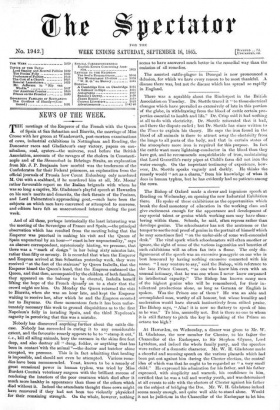The Bishop of Oxford made a clever and ingenious speech
at Reading on Wednesday, on opening the new Industrial Exhibition there. He spoke of these exhibitions as the opportunities which break the dead monotony of education in the working class and give excitement enough for the appearance and development of any special talent or genius which working men may have slum- bering within them. Schools, he said, often repress rather than develope genius. The schoolmaster has not the acuteness or the temper to seethe real proof of genius in the portrait of himself which he may sometimes find " on the under-side of some well-concealed desk." The vital spark which schoolmasters will often smother or ignore, the sight of some of the various ingenuities and beauties of such exhibitions will as often fan into a flame. The only dis- figurement of the speech was an excessive panegyric on one who is best honoured by having nothing excessive connected with his name. " I may venture to say," said the Bishop, with reference to the late Prince Consort, "as one who knew him even with an unusual intimacy, that he was one whom I never knew surpassed in intellectual capacity." The Bishop has known many men of the highest genius who will be remembered, for their in- tellectual productions alone, as long as German or English is. spoken. Was the Prince one of them ? He was an able and accomplished man, worthy of all honour, but whose humility and moderation would have shrunk instinctively from stilted praise. The Bishop says, " Alas ! it is now no flattery to speak of him as he was." To him, assuredly not. But is there no one to whom it is still flattery to pitch the key in speaking of the Prince an octave too high ?






























